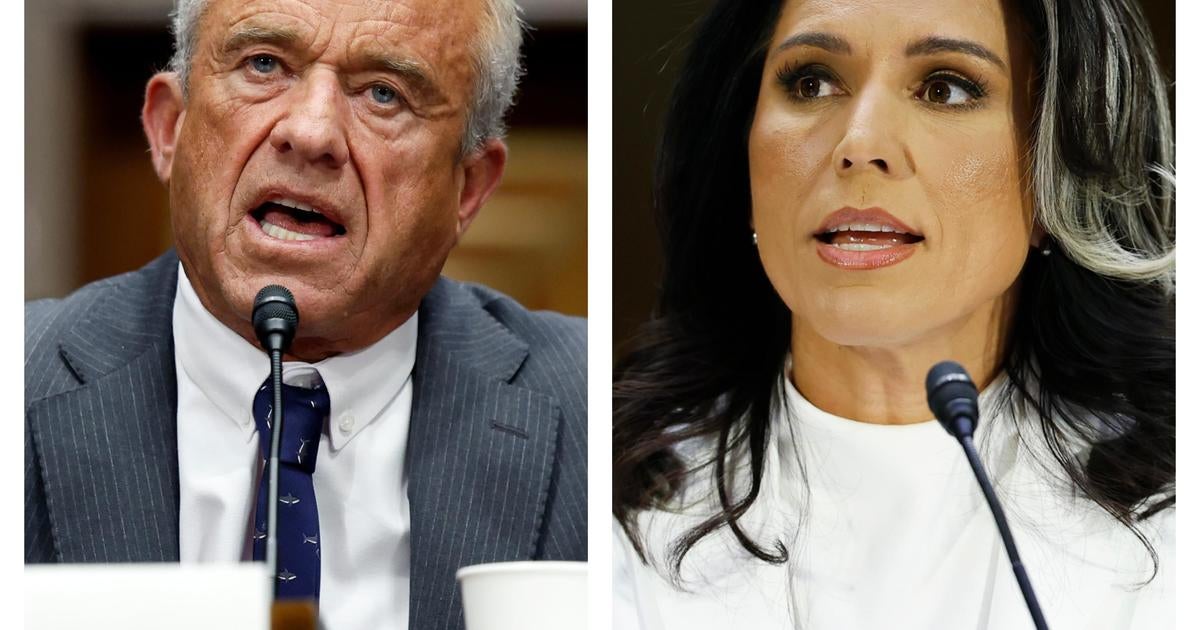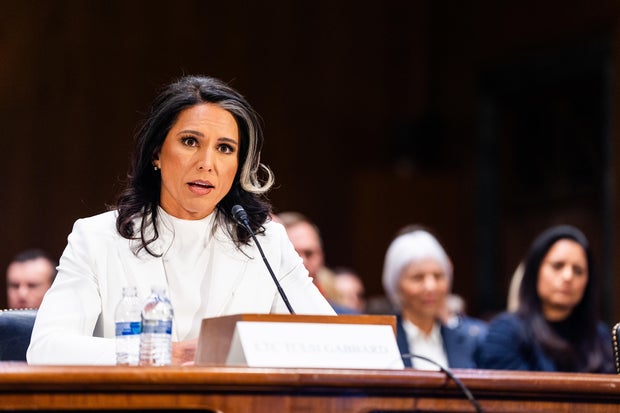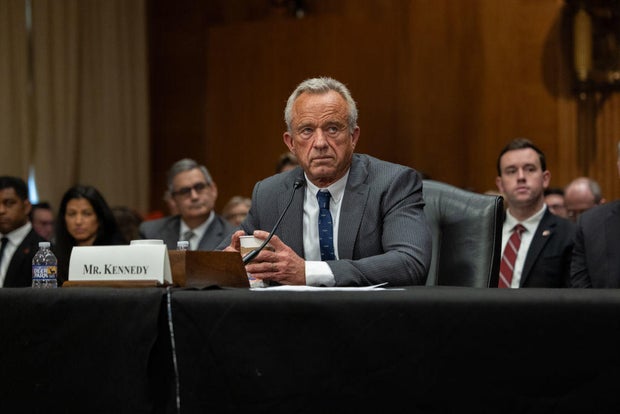Two of President Trump’s most contentious nominees are Tulsi Gabbard, his choice to be the director of national intelligence, and Robert F. Kennedy, Jr., his pick to lead the Health and Human Services Department.
After confirmation hearings last week, the Senate is expected to move forward with their nominations soon. But a handful of Republicans who have lingering concerns about them could foil or at least complicate their nomination processes. Here are the Republicans to watch.
Tulsi Gabbard
The Senate Intelligence Committee is planning to vote on Gabbard’s nomination on Tuesday. She cannot afford to lose a single Republican vote on the committee if all members are present.
Demetrius Freeman/The Washington Post via Getty Images
Lisa Murkowski
Republican Sen. Lisa Murkowski of Alaska has been willing to break with her party on contentious votes. Murkowski was one of the three Republicans who voted against Defense Secretary Pete Hegseth’s confirmation.
Mitch McConnell
Sen. Mitch McConnell of Kentucky was another Republican who voted against Hegseth and has many opposing views with Gabbard, including the controversial positions she’s taken on Ukraine, Russia and a key government surveillance authority, known as Section 702 of the Foreign Intelligence Surveillance Act.
Todd Young
Sen. Todd Young, an Indiana Republican, was among the senators on the Senate Intelligence Committee who appeared unsatisfied with Gabbard’s answers on National Security Agency whistleblower Edward Snowden.
“I think it would befit you and be helpful to the way you are perceived by members of the intelligence community if you would at least acknowledge that the greatest whistleblower in American history — so called — harmed national security by breaking the laws of the land around our intel authorities,” he said at the hearing.
Young would not say Monday which way he is leaning.
“I had a lot of great conversations over the weekend, and that’s all I’m saying,” he said.
Jerry Moran
Sen. Jerry Moran, a Kansas Republican, expressed concern during the confirmation hearing about how Gabbard would handle Russia.
“I want to make certain that in no way does Russia get a pass in either your mind or your heart, or in any policy recommendation you would make or not make,” he said.
Gabbard told Moran she was “offended by the question,” and said “no country, group or individual will get a pass.” She also vowed to be “completely objective, unbiased and apolitical.”
Moran told Gabbard he was pleased with her answer.
John Curtis
Late Thursday, Republican Sen. John Curtis of Utah, who was sworn into the Senate in January, issued a noteworthy statement on Gabbard’s nomination that indicated he could potentially oppose her.
“With Ms. Gabbard, I have said that it was like having a sheet of music that was missing notes,” he said. “I had hoped that listening to the hearing today that she would fill in those gaps. Frankly, there are many notes still missing and a number of sour notes and awkward silences that simply don’t ring true as a political philosophy on critical national security issues. I leave today’s hearing with more questions than answers. Some of her responses, and non-responses, created more confusion than clarity and only deepened my concerns about her judgement and what that will mean in this vital role.”
Curtis, who is not a member of the Senate Intelligence Committee but attended Gabbard’s confirmation hearing, added that he would “carefully” review her record before making a final decision on his vote.
Robert F. Kennedy, Jr.
Nathan Posner/Anadolu via Getty Images
The Senate Finance Committee is scheduled Tuesday to take up the nomination of Kennedy for Health and Human Services secretary. Kennedy underwent two confirmation hearings, one on the Senate Finance Committee, and one on the Senate Health, Education, Labor and Pensions Committee.
Bill Cassidy
Republican Sen. Bill Cassidy of Louisiana was a doctor for three decades, and in that time, he helped vaccinate many children against Hepatitis B. The Republican senator didn’t hide his serious concerns over Kennedy’s positions on vaccines. Kennedy sits on the Senate Finance Committee, which will decide whether to vote Kennedy out of committee.
Kennedy in the past repeated the false accusation that vaccines are tied to autism and has blasted many vaccines as unsafe.
Cassidy made it clear during one of Kennedy’s hearings last week that Kennedy would have to work for his vote. Cassidy told Kennedy he’s been “struggling with your nomination” over his vaccine skepticism. The Republican senator said a friend recently texted him that two children died in a hospital in Baton Rouge, Louisiana, from vaccine-preventable diseases this past month.
“So my concern is that if there’s any false note, any undermining of a mama’s trust in vaccines, another person will die from a vaccine-preventable disease,” Cassidy said.
Cassidy and Kennedy spoke Sunday, according to a source familiar with the situation.
Lisa Murkowski
Moderate Republican Sen. Lisa Murkowski of Alaska is a Republican to watch if or when Kennedy’s nomination advances to the Senate floor.
Murkowski has also voiced hesitation over Kennedy’s past positions on vaccines. Ahead of Kennedy’s confirmation hearings, Murkowksi said she still had concerns.
“Well I’m certainly concerned about it. I know others have other, other points of concerns that they want to drill down on and try to get some commitments, public commitments, from him on,” Murkowski said. “But vaccines are important.”
Susan Collins
Republican Sen. Susan Collins of Maine is another Republican to watch if Kennedy’s confirmation moves forward. Collins, another moderate and the only member of either chamber from New England who is a Republican, is also viewed as a key swing vote.
Collins has challenged Kennedy on his hope to move some funding away from infectious disease research, and pressed Kennedy about his past statements on vaccines. Collins voiced concern that fewer vaccinated children could mean losing so-called herd immunity.
Hundreds of Maine health care professionals last week submitted a letter to Collins, urging her to oppose Kennedy’s nomination, calling him “dangerous.”
Mitch McConnell
Former Senate Majority Leader Mitch McConnell, a polio survivor who still deals with ramifications from the disease he contracted in childhood, is also a Republican to watch on Kennedy.
The Kentucky Republican is a strong advocate of vaccines, and he has warned Kennedy against undermining them.
“The polio vaccine has saved millions of lives and held out the promise of eradicating a terrible disease,” McConnell has said. “Efforts to undermine public confidence in proven cures are not just uninformed — they’re dangerous. Anyone seeking the Senate’s consent to serve in the incoming administration would do well to steer clear of even the appearance of association with such efforts.”
After McConnell voted against Hegseth, Mr. Trump indicated McConnell opposed some of his nominations, saying “of course Mitch is always a no vote, I guess.”
and
contributed to this report.




